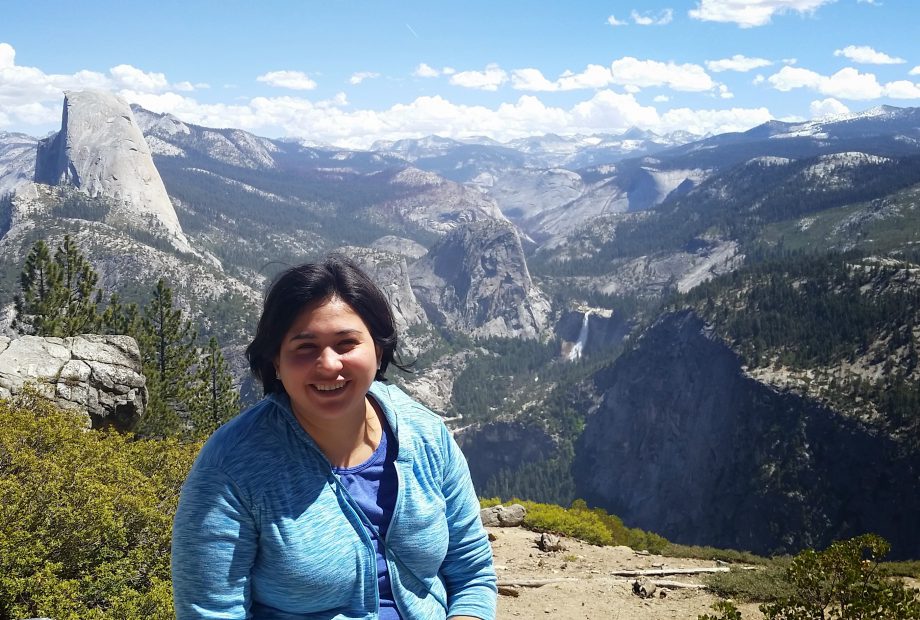Did you have a role model that influenced your decision to work in science?
I never had a clear role model. Since I was young I had a strong need to ask questions and that slowly lead me to a scientific path. However, I am especially thankful to Professor Gerardo Aguilera, my high school math teacher, who encouraged me to go to the Mathematics Olympiad and always suggested I should become a scientist. He also gave me an advanced Algebra book when I was 16 and that opened my eyes to the beautiful world of Mathematics.
What is your scientific background?
I have a BSc in Applied Mathematics (Instituto Tecnológico Autónomo de México). In 2008 I received a MSc in Probability and Statistics (Centro de Investigación en Matemáticas) and I decided to switched fields for my Ph.D. that is in Biology from University of Florida. I am currently a postdoctoral researcher at the University of Idaho working with Dr. Luke Harmon.
Why did you choose to become a scientist?
For me, it wasn’t a natural decision. During college, many of my classmates were more intelligent and knowledgeable than I was, so I didn’t think I could pursue a Ph.D. When I graduated from college I had a job at an Ad Agency (like the one in the Mad Men tv series). I was an analyst in charge of extracting relevant information about the success of a campaign. My clients were big companies like Ford Motors and Nestle. It was a stressful environment, many times a week I would leave my office at 2 or 3 am because my clients needed results the next day. While I was doing that job I always felt that I needed to know more in order to analyze correctly the complex databases that were in my hands. That need eventually encouraged me to pursue a master’s degree in Statistics. It was during the first year as a master’s student that I met my Ph.D. advisor Dr. José Miguel Ponciano, he was the person who introduced me to formal scientific research. I applied to do my Ph.D. at the University of Idaho and at University of Florida, at the end I decided to go to Florida, but life always comes full circle because six years later I ended up in Moscow, ID.
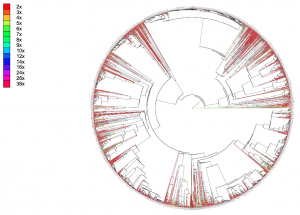
How did you choose your field of study?
I started working with Dr. Ponciano under his antibiotic resistance research. At the time I was purely a statistician so I understood very little of the biological motivation for the research. The need explaining and proposing significant ideas in Biology motivated me to switch disciplines for my Ph.D. It was then when I met my co-advisor, Dr. Gordon Burleigh, that I had an “aha” moment, the data he worked with were phylogenies and complex traits. Phylogenies are tree structures that represent the joint evolutionary history of multiple species. Applying statistical methods in phylogenies is challenging because the tree structure makes the sample non-independent, this is the absolute counterexample to any statistics book, where one of the key assumptions is that sample is independent. My statistician’s heart was jumping with happiness with this challenge, and of course, that directed me to my current research in the flowering plant phylogeny.
Which topic are you working on at the moment?
I work in the area of phylogenetic comparative methods. In general, I study the evolution of different variables (traits) across multiple species that have a joint evolutionary history that is described by a phylogenetic tree. In particular, I am investigating how and how quickly chromosome numbers and genome sizes have changed across all flowering plants. Flowering plants frequently undergo a mutation that is called polyploidy that makes a plant acquire extra sets of chromosomes. The equivalent mutation in humans is trisomy 21 (Down’s syndrome). Humans can only survive having with one extra chromosome, interestingly plants can get a full set of chromosomes or more added and in many cases these extra chromosomes give them ecological advantages over species without extra DNA.
I am interested in how frequent polyploidy occurs and which mechanisms create polyploid species. Since polyploidy was discovered 110 years many scientists and many more unrecognized female lab technicians have counted chromosome numbers for approximately 31,000 flowering plants. The models and statistics I do are the results of many scientists spending long hours in their labs and in the field. I am grateful for researchers in my area for their willingness to share data and knowledge.
What are your biggest achievements, and what your biggest failures?
As a teenager being the first woman to belong to the State of Mexico team at the National Mathematical Olympiad for two consecutive years. I still remember organizers weren’t sure how to make accommodations for traveling with me since teams in the past were composed only of 6 boys.
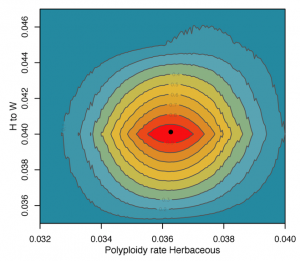
This past summer, I won the Ernst Mayr Award from the Society of Systematic Biologist for my doctoral research. The award
is highly competitive and it evaluates the significance and quality of the doctoral research. The competition takes place during the Evolution conference every year. Ten recent PhDs are selected. Finalists present for 14 minutes their research and two winners are selected by a panel of judges based on the quality and relevance of the presentation. The award came as a big surprise, especially since I almost self-selected out of the competition.
I have as many failures as hair in my head. Just last year I sent 10 different fellowships and they were all were rejected. The lives of scientists are full of rejection and failure, and little by little the rejection becomes new knowledge. Rejection is hurtful but also an opportunity to reevaluate what I need to learn, and how I can be better at my job.
What are the hardest parts related to this work?
The hardest part of my work is once I have evaluated a model finding a mistake or finding a result that does not make sense. Sometimes that means starting from scratch, and not using work that I have been preparing for months which is very disappointing. Because I am in the intersection of mathematics and biology, communicating with two different scientific cultures is hard. It has been a long road finding the adequate terms and building enough knowledge in both areas in order to collaborate and propose meaningful models.
In the personal level, it’s been really hard to see many women struggle with their health during grad school. The stress takes a toll on your body and without the proper support it is difficult to work through illness
Did you ever doubt your abilities as a scientist? Why? How did you handle these situations/feelings?
All the time! Throughout my career, I have questioned whether I am good enough to be a scientist or if I fit in. I suffer from impostor syndrome and stereotype threat. I have also wondered if the ideas I propose are good enough to pursue them and publish them. When I am feeling too doubtful about my abilities it helps to recognize that no two brains are alike, my ideas might not be the most clever but science is democratic and there’s space for them. I always ask for help when I cannot solve a problem or I cannot write a paper. Feedback is really important in science and it keeps me moving forward. I am also convinced that hard work shows results, so if I keep working I will eventually publish and move on. I also built a support network with fellow grad students and a counselor where we were able to develop strategies to keep away impostor syndrome thoughts. This has required some extra work but it has paid off in terms of productivity.
In ten years, what do you hope to have accomplished in terms of your work?
I am looking for a tenure-track job, so hopefully, in 10 years I have an associate professorship. I would like to create rigorous interdisciplinary undergraduate and graduate programs where we have students that are able to develop and apply sophisticated mathematical tools in order to thoroughly investigate pressing biological problems. For biologists is becoming more critical to use the correct analytical tools to answer questions about climate change and conservation (to mention some). We still have many scientists doing critical experiments and collecting large amounts of data but incapable of translating these experiments into meaningful results because of their lack/fear of quantitative training. I would like to change that.
Is there any scientific topic (outside of your field of research) that you think should have more scientific attention? Which one?
Few people in my area are starting to do important progress doing models at different evolutionary scales and reconciling the results. In phylogenetic comparative methods, we look into time scales in the order of millions of years, but evolution also happens in short time scales measured in generation times. Most of the models have only focused on one time scale and the results cannot be extended/shortened into the other one. I expect exciting results coming from young researchers in this topic.
This is a broader idea but I recently met an astronomer who is working in the evolution of galaxies. While talking to her I couldn’t help thinking that evolutionary biology has a lot of ideas to offer in that field. Eventually, I would like to learn about galaxy evolution and find the similarities in evolutionary biology and astronomy.
During your career, have you been specifically mentored or supported by someone?
My two advisors Dr. Burleigh and Dr. Ponciano have been great mentors and cheerleaders. I couldn’t have pursued my current research without their advice and support. I am also grateful for my NSF DDIG that allowed me to have the computational resources needed to test my models and to meet other experts in phylogenetic comparative methods. On the personal end, I have always followed the example and the advice of Dr. Marta Wayne. I think she is one of the best examples of life-work balance. The best advice she gave me was “Rosana, you don’t know how much you are capable of doing in 15 minutes”. She meant that life as a professor can be hectic; service, teaching, research, and family can drain all your time but if you focus 15 minutes at a time doing just one task, eventually work accumulates and you are able to keep moving forward.
If you were completely free to choose a scientific topic to work on, which would it be?
Throughout my studies, I have consciously chosen advisors that have given me the scientific freedom to pursue my own ideas. My heart and brain are definitely set in the science I am currently doing. This scientific freedom can be good and bad as a grad student. The positive part is that following your own path keeps you motivated. However, it can be a long and rocky road if your advisors have not worked on the specific topic you are pursuing. It becomes necessary then to find extra support and financial means to find those experts.
What is the funniest or most memorable thing that has happened to you while working in science?
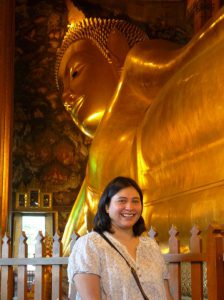
In 2011 I applied for a small grant that allowed me to go to Thailand to teach a statistical ecology workshop at King Mongkut’s University of Technology at Thonbury. A month before leaving I fell off my bicycle, broke my foot and required surgery. Recovery was going to take 5 months so I decided that if I was going to go I needed a knee scooter. I traveled half the world with a knee scooter! Needless to say, the reactions from Thai people were hilarious. Some wanted to pull the knee scooter from me, some wanted to lift me with the scooter, others wouldn’t dare to touch it. In all scenarios, people and tuk-tuks were very helpful because most of the places in Bangkok are not wheelchair accessible. I even had a Japanese tourist taking pictures of the scooter because she wanted one for her little nephew as a toy.
Do you come from an academic family?
Not at all. No one in my family has ever been a scientist. My father is an accountant and my grandparents did not allow my mother to go to high school because she had twin brothers following her in age. My grandparents thought the twins’ education was more critical than my mom’s. My mother ended up having a secretary technical degree so she could contribute financially to her large household.
How does your family regard your career choice?
At the beginning, it was difficult for them. I was the first woman in my extended family to leave the house for college. My dad was always on board, he trusted I could accomplish what I wanted. There were definitely family members that suggested I was going to fail miserably. I know today all of them feel proud that I became a scientist and they like to joke about what I do. They like to ask me over and over about chromosomes, DNA, and about probability (whether or not I can make them rich at Las Vegas- the answer is always no).
Besides your scientific interests, what are your personal interests?

I love cooking Mexican food and having friends over for dinner. I l celebrate the day of the death and every year I make chocolate skulls for my friends to decorate. I grew up in a big industrial city and as a child my contact with nature was limited. As I’m getting older I am learning to enjoy more and more camping and playing outdoors. After a visit to the Smokies, I became a little obsessed with the synchronous fireflies and I’ve been reading some books about synchrony in nature.
Is it hard to manage both career and private life? How do you manage both?
I don’t manage it too well to be honest. But I always set time during the day to break from work. My best ideas don’t happen after 8 hours working, they happen during those breaks. There are times when my focus is more important at home and other times when work takes priority. I like to think that if in my monthly hours I have invested the same time working than with my family everything will be okay. I like to have an organized schedule and set goals every week that allows me to do progress but also not feeling too overwhelmed when I take time off.
If you had the option to give advice to a younger version of yourself, what would that be?
“Invest all your time and effort in your ideas, don’t spend it worrying about the future. Opportunities will come despite economic struggle and people.”
“Be kind to yourself.”
What were the biggest obstacles you had to overcome? Did you ever have the impression that it would be easier/harder if you were male?
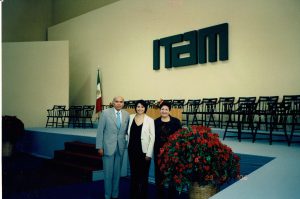
The first was being the first woman in the family to leave for college. It was definitely a struggle not to have a female role model to ask what to expect being alone. I imagine it would have been easier for my family an for me if I was a man because that was culturally more accepted. However, the most difficult struggle was the socioeconomic barriers that came with that college move. When I was ready to apply for college in 1999, students in the largest public university in Mexico (UNAM) went on strike. They closed the main campus, classes and admissions were shut down. That same year a big economical crisis left my parents unemployed, that meant that my only two options were to work or to get a scholarship in one of the private universities. Through a lot of hard work, I was able to go for the second option. The following years were difficult, trying to keep up with grades while holding a small job at my university. I needed that job because my dad could only give me the equivalent of US$5 every week, many weeks I wasn’t able to pay for copies for homework so I stayed very late in the library using the reserved book to finish projects.
What kind of prejudices, if any, did you have to face? How did that make you feel? Were you able to overcome these?
I have faced the classical misconceptions about women and math. That has improved with age, but as a young woman, very few people believed in my proficiency and knowledge. Since I moved to the USA I face different challenges, the typical stereotype of being Latino, or immigrant, mostly from people that don’t know what I do for a living. In academia, some of my worst experiences have been professors that have treated me as invisible, a professor calling me emotional after I expressed my concerns about a candidate’s interactions with grad students, and a different professor mocking my English accent. All of these situations are preventable with more mandatory diversity programs directed to professors but I also believe that by educating and creating awareness in my male colleagues (the future professors) I can make a difference. One of the things that I have been working on is learning strategies to respond to these terrible situations quickly but also in a polite manner that gives the offender food for thought.
In your opinion, which changes, if any, are needed in the scientific system to be more attractive to female scientists and possible future scientists?
I think there are three specific changes that need to be done ASAP.
First, mandatory diversity and integration programs that put professors and students in the shoes of women and URMs. Most of the universities only have online programs that are not creating enough discrimination and harassment awareness and the “training” is accomplished by a series of clicks, we urgently need to change that. We are seeing some change on the reporting end using social media (see Gina Baucom’s blog entries at Dynamic Ecology), staying quiet is no longer an option. I also think as women we need to educate or colleagues. It would be great if a talented cartoonist could make the “bystander guide to standing up against harassment and discrimination in academia” showing our male colleagues how to respond in case another man offends women or URMs in their presence.
Second, paid leave and support networks for maternity (and paternity) at graduate and postdoctoral levels. For example, most universities will only allow leave under FMLA for postdocs after being in the system for a year. Most postdoctoral positions only last a year that makes women ineligible to FMLA (even unpaid). Depending on the location, access to daycare can be a struggle, some daycares have waiting lists up to a year, most postdocs won’t know they are moving until 2 months before the position starts, this results in many women quitting science to stay at home.
Third is mental health awareness. Grad school and academic jobs are extremely stressful. I don’t think we have enough tools and resources to detect and help people with impostor syndrome, depression, or anxiety in academia. Creating individualized programs and support networks for women with mental health concerns would definitely make more attractive academic jobs while adding to the diversity.
Do you have anything else that you’d like to tell us about?
Yes! If you are reading this and are a young diverse woman facing similar challenges to the ones I had (and have), I just want to tell you that it is possible to overthrow those walls. You will always find someone that wants to support you and that will create opportunities for you to be successful. If you don’t know anyone else I am here to listen and help. Contact me!
Contact Rosana via Twitter!




